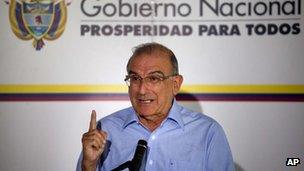Colombia peace talks with Farc in Cuba make progress
- Published

Former vice-president Humberto de la Calle expressed optimism after the latest round of talks
The Colombian government and the country's main rebel group, the Farc, have hailed progress after the end of the 12th round of peace talks in Cuba.
The government's chief negotiator, ex-vice president Humberto de Calle, said they had never got this far before.
In a joint statement, the two sides say they are "building agreement" on the rebels' participation in politics, despite a tense week in Colombia.
The five-decade-old conflict has claimed hundreds of thousands of lives.
Meanwhile, President Juan Manuel Santos praised the army for killing the regional Farc leader, Jesus Antonio Plata Rios, known as Zeplin, on Friday.
"Thanks to the joint work of the air force and the army, the head of Farc's western front, Zeplin, has been neutralised," he wrote on Twitter.
Mr Plata Rios led the rebels in western Colombia and was also in charge of gathering support for the rebels in the region, authorities say.
'Secure opposition rights'
The joint statement issued by the Colombian government and the left-wing rebels in Cuba says concrete proposals have been presented and discussed by both parties.
They started building an agreement to "secure rights and guarantees for the exercise of the political opposition", it says.
Political participation is the second bloc of issues being negotiated at the talks aimed at ending more than 50 years of armed conflict.
"Never before has anyone come this far," Mr de la Calle told reporters at the end of the latest round of negotiations.
Land reform was the first item agreed on the six-point agenda of the talks, in May, after more than six months of negotiations.
Mr de la Calle's optimistic words on Saturday came after a tense week in Colombia, with strong words coming from the government.
Farc leaders criticised Mr Santos remarks on Friday, saying that rebel leaders would be tracked down and killed by government forces.
In an interview earlier in the week, the Army commander, General Sergio Mantilla, said Colombia's largest rebel group was "in agony".
But the left-wing group said they were not "demoralised" and blamed the government for pre-emptying the talks.
Despite the slow pace of negotiations, the Colombian government has insisted a peace accord can be agreed before the end of the year.
The Farc warned of the dangers of rushing into a settlement.
"It is possible [to reach an agreement by November]. But to achieve peace, you need time. A bad peace deal is worse than war," he said in an interview with Colombian network RCN.
A study by Colombia's National Centre for Historical Memory suggests 220,000 people have died as a result of the country's five decades of internal conflict.
There is huge pressure in Colombia for justice for those who have perpetrated acts of violence from both sides of the conflict.
The government has promised to bring to justice those responsible.
The rebels say most of the victims were poor peasants and other civilians targeted by the army and right-wing paramilitaries for their alleged support to the rebels.
- Published29 July 2013
- Published16 July 2013
- Published27 May 2013
- Published3 December 2012